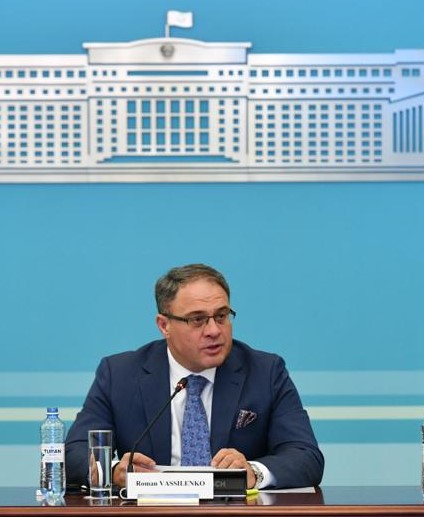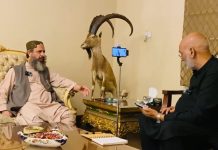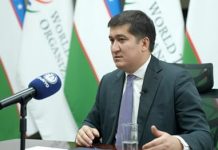MR.Roman VASSILENKO
Deputy Minister of Foreign Affairs of the Republic of Kazakhstan
Roman Vassilenko was born in 1972 in Shymkent.He graduated with honors from the Military Academy of Economy, Finance and Law of the Armed Forces of the Russian Federation in 1994, receiving a degree as a referent interpreter and an expert in international law.
Career
From 1994 to 1996, he served on the staff of the International Relations Department of the Presidential Administration of the Republic of Kazakhstan.
He has been on Kazakhstan’s diplomatic service since 1996, first as Third Secretary and later as Second Secretary at the Embassy of Kazakhstan to the United Kingdom of Great Britain and Northern Ireland.
In 1999-2000, he worked as Assistant to the Head of Prime Minister’s Office of the Republic of Kazakhstan.
In 2000-2007, he served as First Secretary and later as Counsellor of the Embassy of Kazakhstan in the United States.
In 2007-2009, he worked as Chief Inspector of the Secretariat of the Secretary of State of Kazakhstan; Consultant of the President’s Chancery of the Republic of Kazakhstan, and Deputy Chief of Staff to the Secretary of State of Kazakhstan.
In 2009-2012, he served as Chairman of the Committee for International Information of the Ministry of Foreign Affairs of Kazakhstan, overseeing the communications for the Ministry during such important periods as Kazakhstan’s chairmanships in the Organization for Security and Cooperation in Europe (2010) and the Organization of Islamic Cooperation (2011-2012).
In 2012-2013, Roman Vassilenko worked as Deputy Director of the Nazarbayev Center, a multifunctional scientific, analytical, humanitarian and educational public institution.
In 2013-2014, he worked as Ambassador-at-large at the Ministry of Foreign Affairs overseeing the global communications efforts of The ATOM Project, among other activities.
In 2014-2016, he again served as Chairman of the Committee for International Information of the Ministry of Foreign Affairs.
In 2016-2019 he was appointed Deputy Minister of Foreign Affairs of the Republic of Kazakhstan.
In 2019-2022 – Ambassador Extraordinary and Plenipotentiary of the Republic of Kazakhstan to the Slovak Republic.
Since January 2022 he serves as Deputy Minister of Foreign Affairs of the Republic of Kazakhstan.
He holds the diplomatic rank of Ambassador Extraordinary and Plenipotentiary.He was awarded the order “Құрмет” and the medal “Ерен еңбегі үшін”.He speaks English, French, Vietnamese and Slovak.He is married with three children.
LP:How has Kazakhstan’s foreign policy evolved for the country to become a proponent of peace and constructive diplomacy in recent years?
Mr. Roman Vassilenko: Kazakhstan’s foreign policy of is characterised by a multi-vector, peace-loving, balanced, and pragmatic nature. This strategy was outlined in the early 1990s and has been consistently and successfully implemented for more than three decades.
Today, Kazakhstan maintains diplomatic relations with 186 countries, and has representative offices on all continents, including 62 embassies and more than 20 consulates. Strategic partnership relations have been established with many key global players.
The foreign policy strategy, aimed “at gaining friends, not enemies”, plays a key role in ensuring the country’s security and stability. Kazakhstan has no conflicts or unresolved issues with any state in the world.

A pragmatic multi-vector policy has enabled Kazakhstan to integrate into the world community, promote its national interests as effectively as possible, and create optimal external conditions for addressing internal development issues. This includes economic development: our country is the undisputed leader in Central Asia in terms of attracting foreign direct investment, accounting for 60 percent of the total FDI in our region.
Kazakhstan firmly adheres to the course set at the dawn of independence. Under the leadership of President Kassym-Jomart Tokayev, the country continues to expand the horizons of its foreign policy to preserve and strengthen its engagement on the world stage.
Leader of the anti-nuclear movement
Kazakhstan’s independence began with several major decisions of the country’s leadership, which were unprecedented in the annals of global history.

Semipalatinsk, the world’s largest nuclear test site run by the Soviet Union, was closed down by a presidential decree on 29 August 1991. It functioned for several decades, leaving deep scars on the Kazakh land, and affecting the lives of 1.5 million of our citizens.
Post-independence, Kazakhstan confronted another pressing dilemma: what to do with the vast nuclear arsenal – the 4th largest in the world – inherited from the Soviet Union. A pragmatic decision was taken by the leadership to voluntarily renounce its nuclear power status, which not only strengthened the country’s authority in the international arena, but also enhanced trust, particularly among investors.

Such decisions cemented one of the core tenets of our country’s foreign policy. Today, Kazakhstan is a recognised as a leader in the global movement for nuclear disarmament and non-proliferation. The date marking the Semipalatinsk site’s closure, 29 August, has been inscribed in the UN calendar as the International Day against Nuclear Tests through a unanimous decision of the UN General Assembly. Furthermore, in 2006, the Central Asian Nuclear-Weapon-Free Zone was established. In 2017, the IAEA Low Enriched Uranium Bank was opened in our country.
Kazakhstan is a party to all major international nuclear disarmament and non-proliferation treaties. Notably, it was one of the first countries to sign and ratify the new Treaty on the Prohibition of Nuclear Weapons (CTBT).
Multilateral co-operation
Kazakhstan is an active member of more than 40 international organisations, including the UN (since 2 March 1992) and its specialised agencies, as well as the WTO, IAEA, OSCE, SCO, OIC, CIS, CSTO. Additionally, we are part of prominent global financial entities such as the IMF, IBRD, and EBRD.
One of the facets of our multi-vector policy is our commitment to not just actively participate in the activities of key international organizations, but also to initiate new multilateral platforms for dialogue and cooperation.

A testament to this approach was our early initiative to establish the Conference on Interaction and Confidence Building Measures in Asia, which was presented at the UN General Assembly in 1992. Today, CICA has 28 member countries and is in the process of transformation into a full-fledged organization.
Kazakhstan played a crucial role in the creation of the Commonwealth of Independent States and the Eurasian Economic Union, both of which have significantly bolstered economic cooperation between the countries of the former Soviet Union.
We were also at the forefront of establishing the Shanghai Cooperation Organisation, a substantial and influential body comprising China, Kazakhstan, Kyrgyzstan, India, Iran, Pakistan, Russia, Tajikistan, along with Uzbekistan.
Further cementing our proactive stance in the international community, Kazakhstan, along with other countries, spearheaded the creation of the Turkic Council, which has recently transformed into the Organisation of Turkic States.
World recognition
Over the past 30 years, Kazakhstan has consistently received acknowledgments of the effectiveness of its foreign policy, a course from which it has never wavered since the first days of independence.
A significant affirmation of our nation’s role as a responsible global player came in 2010, when Kazakhstan chaired the Organisation for Security and Cooperation in Europe in 2010. Kazakhstan became the first post-Soviet republic and the first Asian state to be entrusted with the chairmanship of an organisation with a membership exceeding 50 countries. A crowning achievement of Kazakhstan’s diplomacy was successfully hosting the first, and as of now, the only OSCE summit of the twenty-first century. This summit culminated in the adoption of the Astana Declaration. In 2017-2018, Kazakhstan made its debut in the UN Security Council as a non-permanent member, an honour bestowed upon us by a majority vote from the member nations of this global body. This election marked the first time a Central Asian country served on the Security Council. Over those two years, Kazakhstan diligently pursued its priorities, including achieving a nuclear weapon-free world, resolving local conflicts and threats, promoting the interests of Central Asia in the sphere of regional security, and countering terrorism.
Over the past 30 years, Kazakhstan has hosted many events of the highest level. We have hosted summits for organizations such as the SCO, CIS, OIC, CICA, EAEU, and the Turkic Council. In 2017, the Kazakh capital also hosted the International Specialised Exhibition EXPO.
Kazakhstan has a unique reputation in the international community as an “honest broker”, which enables our country to play a distinctive role in world politics. In particular, as a result of our foreign policy, the Kazakh capital hosted negotiations aimed at resolving the crisis in Syria. Through the Astana Process, both the official Syrian authorities and the armed opposition came together at the negotiations table for the first time, along with representatives of the three guarantor states – Iran, Russia and Turkiye. Twenty rounds of talks were held.
Further testament to the appreciation for Kazakhstan’s diplomacy is the prominent roles our representatives hold in major international organizations and structures. For example, in 2011-2013, President of Kazakhstan Kassym-Jomart Tokayev served as the Deputy Secretary-General of the United Nations and Director of the organisation’s office in Geneva. Between 2018 and 2022, Bagdat Amreev assumed the role of Secretary General of the Organisation of Turkic States. Today, Askar Mussinov serves as the Deputy Secretary General of the OIC, Kairat Sarybay is Secretary General of CICA, and Kairat Abdrakhmanov holds the position of OSCE High Commissioner on National Minorities.
LP:Could you elaborate on the role and significance of the Congress of Leaders of World and Traditional Religions in promoting interreligious and interfaith dialogue on a global scale?
Mr. Roman Vassilenko: The Congress of Leaders of World and Traditional Religions was initiated by Kazakhstan in 2003 in the country’s capital, Astana. Its primary mission is to foster dialogue, understanding, and cooperation among religious leaders from various faiths around the world.
The Congress brings together a diverse array of religious leaders representing world religions, including Christianity, Islam, Judaism, Buddhism, Hinduism, Taoism, and many other faiths. This diversity ensures a comprehensive representation of religious beliefs and practices for enriched discourse.
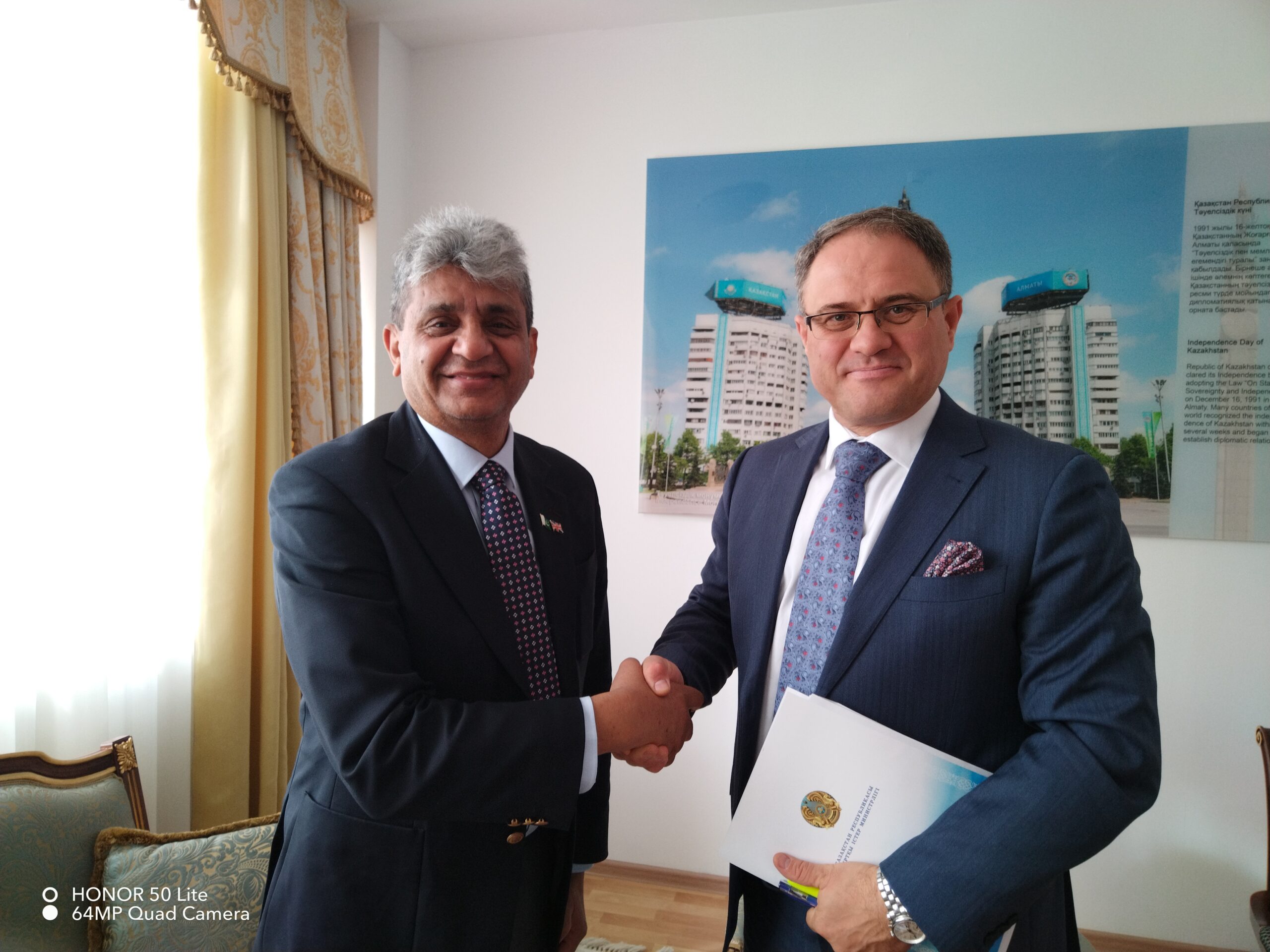
The Congress meets every three years, providing a consistent platform for interfaith dialogue. This ensures continuous discussions and evolving strategies to bolster peace and mutual understanding.
The discussions at the Congress are not limited to theological or doctrinal issues. The Congress often addresses contemporary global challenges, such as terrorism, extremism, and the misuse of religious narratives for violent purposes. By doing so, it aids in situating religious teachings within contemporary contexts and encourages a collective stance against the distortion of religious principles. Given its broad international participation, the resolutions, declarations, and discussions of the Congress have a global reach. The Congress acts as a beacon for other regional and local interfaith initiatives, amplifying the importance of interfaith dialogue at multiple levels.
One of the pivotal outcomes of the Congress’s deliberations is the fostering of mutual respect among different religious traditions. By providing a platform where differences are acknowledged but also transcended for the common good, the Congress plays a role in reducing religious prejudices and misconceptions.
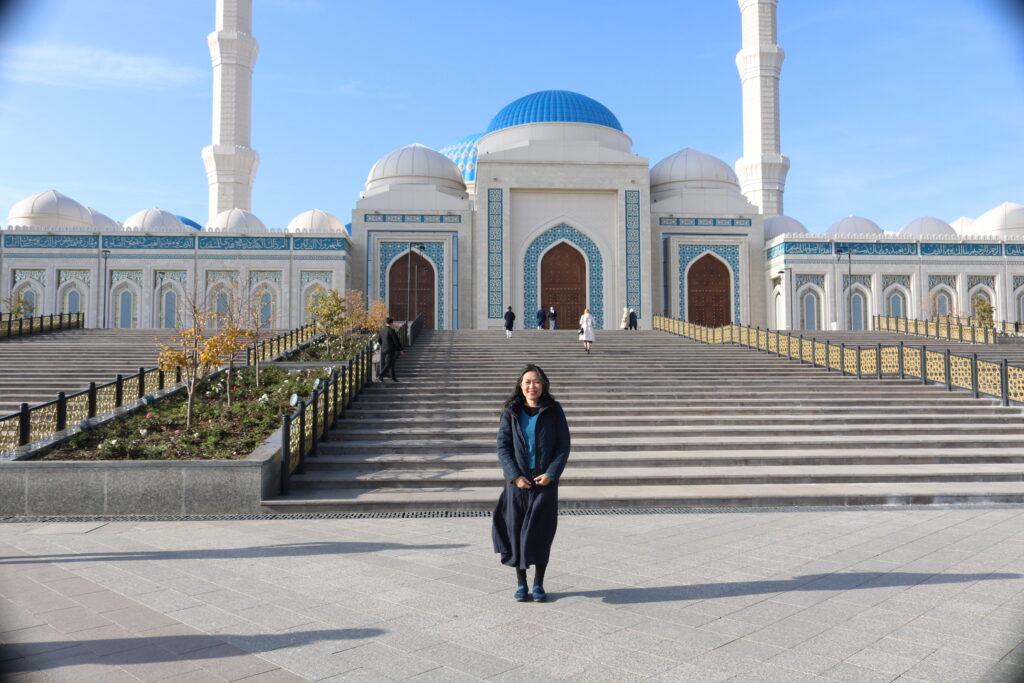
The ultimate goal of the Congress is the promotion of global peace. Through dialogue and understanding, the Congress hopes to reduce religious conflicts and tensions and encourage religions to be forces for unity, peace, and constructive development.
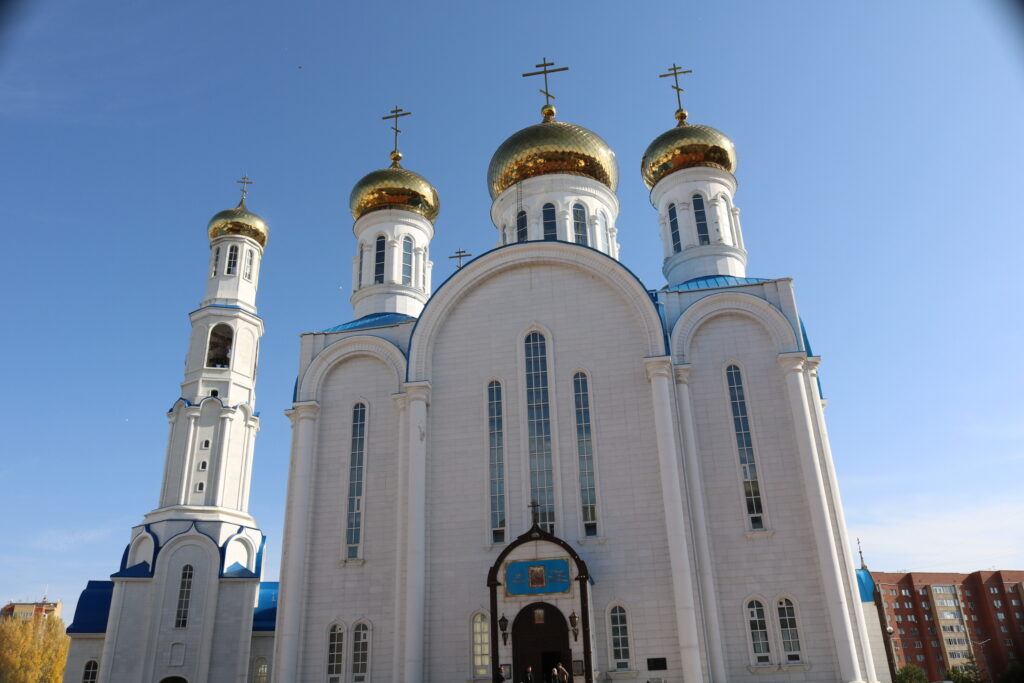
The Seventh Congress, held in September 2022 in Astana, hosted eminent religious leaders, including Pope Francis, Grand Imam of Al-Azhar Sheikh Ahmed al-Tayeb, chief rabbis of Israel, among others.
The Congress plays a pivotal role in advancing interreligious and interfaith dialogue on a global scale. Its efforts underscore the importance of mutual respect and understanding in a world that is increasingly interconnected yet also faces challenges of religious misunderstandings and misinterpretations.
LP:President Tokayev mentions the rich cultural and religious diversity in Kazakhstan. How has this diversity influenced the country’s approach to interfaith dialogue and cooperation?
Mr. Roman Vassilenko:The rich cultural and religious tapestry of Kazakhstan has played an influential role in shaping the country’s approach to interfaith dialogue and cooperation.
Kazakhstan’s location as a nexus between Europe and Asia has historically made it a crossroads of cultures, ethnicities, and religions. The Silk Road, which passed through the region, facilitated not just trade but also the exchange of ideas and beliefs. Over the centuries, various religious traditions, from Islam and Christianity to Buddhism and Shamanism, have coexisted in the region.
Today, while most Kazakhs identify as Muslims (primarily of the Sunni denomination), there are significant communities of Russian Orthodox Christians, Protestants, Catholics, and smaller groups of Buddhists, Jews, and adherents of other religions. This diversity has necessitated an approach to governance that fosters mutual respect and harmony among these groups.
Kazakhstan’s Constitution emphasizes the secular nature of the state, ensuring that no religion can dominate or be used to infringe on the rights of others. This secular framework has provided a space for various religious communities to coexist and practice their faith without state interference.
Recognizing the value of its religious diversity, Kazakhstan has been proactive in promoting interfaith dialogue both domestically and internationally. The Congress of Leaders of World and Traditional Religions is a testament to the country’s commitment to this cause. By hosting this global event, Kazakhstan underscores its role as a mediator and bridge-builder in religious dialogues.
Various educational programs and events in the country emphasize the history and value of Kazakhstan’s religious diversity. By educating the younger generation about the different religious traditions present in the country, Kazakhstan aims to foster a sense of mutual respect and understanding.
Under the leadership of President Tokayev, Kazakhstan has consistently emphasized a policy of religious tolerance. This approach is not just a top-down directive but is also embedded in the cultural psyche of the Kazakh people, who have historically lived in a multi-ethnic and multi-religious society.
Kazakhstan’s commitment to interfaith dialogue is also evident in its diplomatic endeavours. The country frequently emphasizes the importance of religious tolerance and dialogue in its interactions with other nations and international organizations.
The rich cultural and religious diversity of Kazakhstan has been a driving force behind its proactive and inclusive approach to interfaith dialogue and cooperation. Rather than seeing diversity as a challenge, Kazakhstan has embraced it as a strength, leveraging its position to promote peace, understanding, and cooperation both within its borders and on the global stage.
(During my visit to Kazakhstan, I had the opportunity to meet the Deputy Foreign Minister. When I requested an interview, he graciously spared some time from his hectic schedule. In this interview, some of his experiences are shared. I would like to extend my gratitude to the Deputy Foreign Minister. Raza Syed)



